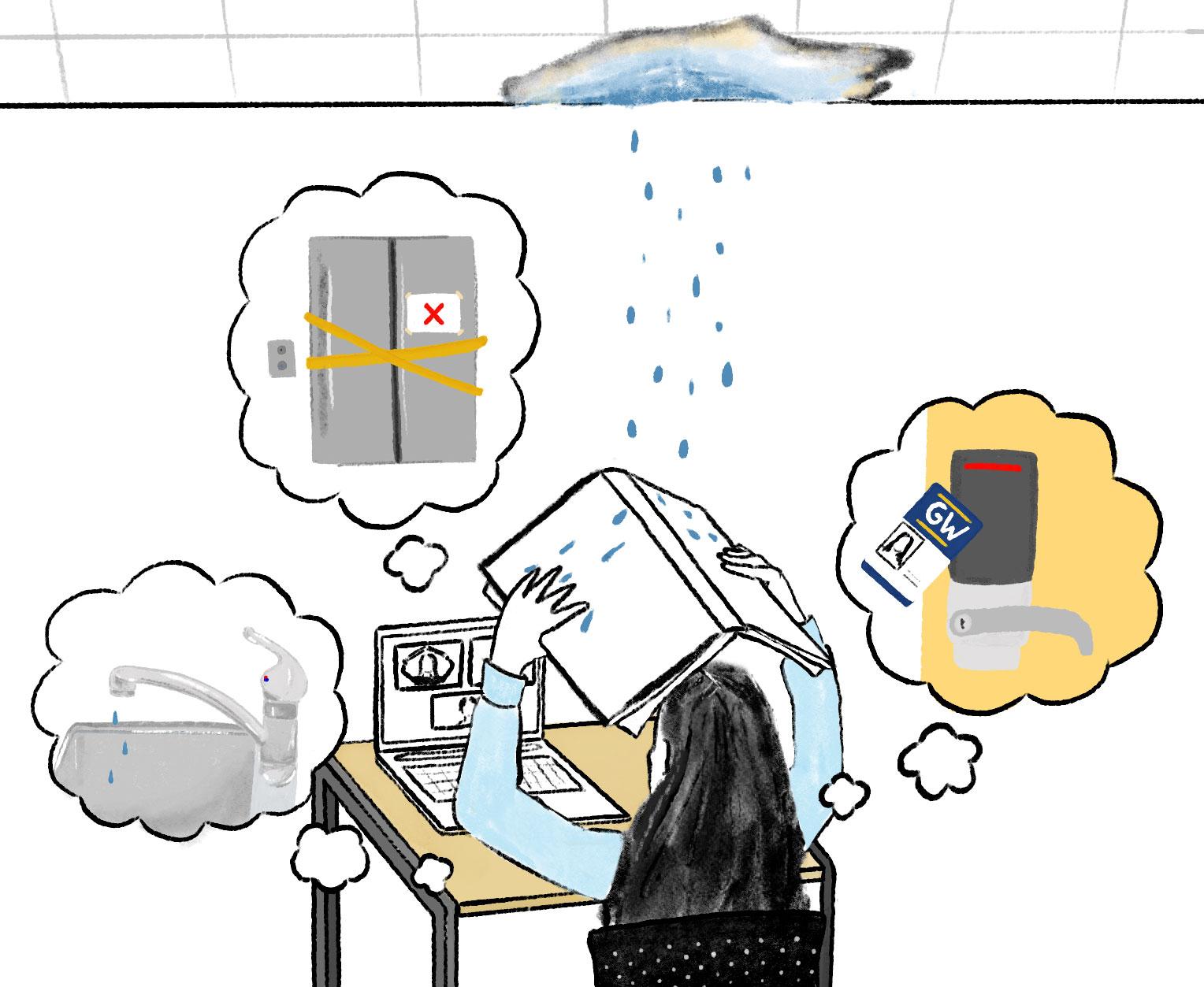More than seven months after the University responded to mold infestations last semester, this academic year is set to end much the same way it began. At The Aston and other residence halls, students are still dealing with persistent maintenance issues and facilities problems.
Students’ rooms are their safe spaces, but reports of flooding, leaks, mold, water shutoffs, elevator outages, security concerns and delayed maintenance highlight how unsafe they really are. The University must respond to these concerns more rapidly and transparently and offer more than token compensation to students facing emotional and financial stress over the state of their residence halls. Until it does so, students’ persistent self-advocacy can apply pressure on GW to meet one of their most vital needs – a safe, secure living space.
GW has renovated nearly a dozen of its decades-old first-year and upperclass residence halls within the last decade. The COVID-19 pandemic and the continued search for a permanent University president have respectively interrupted and set back GW’s strategic plan. Dramatic overhauls of mid-century apartment buildings have meanwhile allowed the University to continue housing thousands of students in the nation’s capital.
These expensive renovations allow for dramatic ribbon cuttings, but behind-the-scenes preventive maintenance and emergency repairs are equally vital. The University’s $22 million, three-year plan to improve campus accessibility barely begins to scratch the surface of a $300 million overall deferred maintenance backlog – for comparison, the ongoing overhaul of Thurston Hall cost $85 million. It’s unclear which maintenance projects the University has deferred and how long it has deferred them.

Maura Kelly-Yuoh | Cartoonist
Addressing the overall condition of students’ residence halls seems like even less of a priority than already deferred maintenance. And while the University’s 2022 budget provides more than $129 million for capital expenditures, which includes facilities improvements meant to address that maintenance backlog, the University has not clarified how it evaluates which issues are the most pressing.
Perpetually deferred maintenance can pose a real threat to students’ safety. Perhaps the problems facing residence halls are so severe that preventive action is simply no longer possible, but officials are surely aware that such problems exist.
While the context of the pandemic and the challenges involved in returning to campus explained GW’s failure to properly inspect its buildings for mold at the beginning of last semester, it’s certainly no excuse for current issues. Sporadically reacting to mold, poor ventilation, pipe bursts, HVAC issues, stuck elevators and dozens of other malfunctions days or weeks after they appear is hardly fair to students and others who reside on campus, especially when the University is aware of the inconvenience and even danger they pose.
Across campus, officials’ failure to respond to an array of maintenance and facilities issues means residence halls can be an unwelcoming, hazardous environment rather than a unique, comfortable and safe residential experience. GW’s failure to address these concerns has attracted the attention of D.C. officials, who fined the University $1,000 in 2019 for sewage leaks in Building GG.
The University understands that maintenance issues and subsequent attempts to resolve them can hugely disrupt students’ life, work and academic schedules and force them to shuffle between residence halls and off-campus living arrangements with little to no access to their personal items. In 2018, GW reimbursed residents of Guthridge Hall an unspecified amount after pipe damage, flooding and ceiling leaks temporarily displaced students living there. Compensation is one means of recourse, but it must be more than a token gesture – earlier this month, the University has so far publicly offered only $250 to the residents of The Aston for similar problems.
If GW is unable to provide its students with genuinely habitable conditions, it ought to reimburse them an amount more reflective of their total housing costs that can reach over $16,000 dollars a year. The University’s requirement that students live on campus for at least three years establishes an obligation to provide students with quality, affordable housing. If long-term disrepair prevents students from living in safe and secure conditions, GW ought to grant exemptions allowing them to live off campus. It isn’t fair to make residents pay thousands of dollars a year to live in subpar conditions, and that poor cost-benefit ratio will determine the University’s reputation among current and prospective students.
Until GW is able to address these issues, the burden of reporting, pursuing and addressing them unfairly falls to the student population. Yet their persistence seems to have paid off – while inadequate, officials issued Aston residents the $250 housing credit only after dozens of students used an email template to notify them of collective and individual problems in the building. While it shouldn’t take petitioning GW en masse to address these concerns, and its response ought to be more than a $250 credit, it’s an effective strategy in the absence of clear communication and effective action from the University.
Officials have been tight-lipped about the reasons behind and their response to these facilities problems, but leaks, outages and floods are detrimental to students’ lives and livelihood. A more thorough acknowledgment of this crisis and more transparent and effective communication would address students’ concerns pending actual repair work.
Every student deserves access to quality, safe and affordable housing. While there may not be a quick fix to longstanding maintenance and facilities issues, one thing is clear – to enjoy the benefits of student life at GW, students need to feel comfortable living there.
The editorial board consists of Hatchet staff members and operates separately from the newsroom. This week’s staff editorial was written by incoming opinions editor Ethan Benn and incoming contributing opinions editor Riley Goodfellow, based on discussions with culture editor Anna Boone, contributing sports editor Nuria Diaz, design editor Grace Miller and copy editor Jaden DiMauro.

